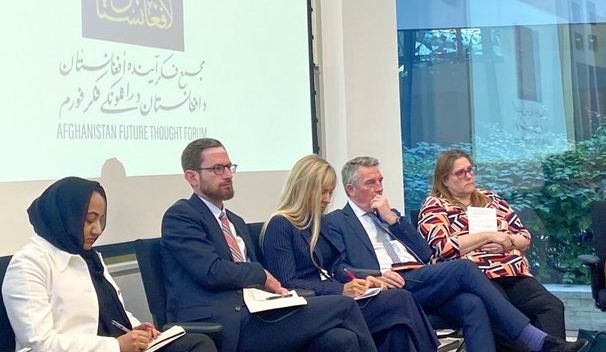US Special Representative for Afghanistan, Thomas West has noted that every Afghan participant at Afghan Future Thought Forum in Doha voiced support for dialogue as a solution to the Country’s challenges and oppose armed conflict in Afghanistan. The US Special Representative for Afghanistan attended the meeting of the Afghanistan Future Though Forum (AFTF) that brought a broad group of Afghan men and women, civil society leaders, economists and politicians, foreign diplomats, and Afghan elders including Taliban to the negotiating table to deliberate on the Afghan issue and conceive a mutually agreed solution to the problem. According to the US Diplomat, the participants spoke out in favor of dialogue and condemned the use of violence and force, while different recommendations regarding the role of the international community in Afghanistan had been discussed during the session. The participants urged the Taliban authorities to initiate dialogue and lift their restrictions on women’s employment and education.
Afghanistan has been a victim of civil unrest, ethnic and communal violence, and persistent foreign interference over the past several decades. Meanwhile, the people of Afghanistan endured massive internal displacement, mass evacuation, and refuge in other nations as a result of recurrent foreign interventions, domestic armed conflicts, and civil insurgencies in the past. Historically, foreign-backed political and armed groups had been at the forefront of dispelling violence and chaos in the country and an all times battle for power and control had been continuing throughout history. The Taliban takeover of Afghanistan took place in aftermath of the Doha agreement and the decade-long war between the US-led coalition and the Taliban. Although the United States, the global community, and regional neighbors including Pakistan had been endeavoring for a consensus political setup to realize the dream of a stable Afghanistan, however, Taliban resurgence and a lack of cooperation from Afghan Republicans exposed the country to fresh anarchy once again. Meanwhile, certain policies of the Taliban regime have caused deep frustration at domestic and global levels and reduced the scope for an inclusive government that steers the Afghan nation out of the current political and economic upheavals in the country.
Ostensibly, the Taliban takeover, the fall of the Ghani regime along with the hasty withdrawal of the United States set the stage for fresh anarchy in Afghanistan. Apparently, the foreign interference and global conspiracies had yet not come to an end in the country as several multilateral initiatives are separately underway to conceive a sole purpose of gaining political inclusiveness and sustainable peace in Afghanistan yet major nations such as the United States, Russia, and China are not ready to launch a collective endeavor that brings lasting peace in Afghanistan. After the meeting of Foreign Ministers of Russia, China, Iran, and Pakistan, a US-sponsored think tank initiative, the Afghanistan Future Thought Forum (AFTF) held its meeting for the same purpose in Doha that portrays a wide gap and confronting schemes of opposing blocs regarding the issue of Afghanistan. Apparently, such divided and conflicting efforts would complicate the matter and less likely to conceive a mutually agreed wide-ranging solution to the problem that ends conflict in the country and pave the way for lasting peace in Afghanistan. Multiple forums including the Quad Foreign Ministers meeting, the AFTF, and other mechanisms have their perspectives regarding the current situation in the country, that contradicts others while the scopes of consensus diminish because of diverging interests of the warring Afghan groups and their backers. In fact, the United Nations should take the lead and brings Afghan parties, and all regional and global stakeholders to one table to conceive an equally acceptable inclusive political setup that guarantees peace and stability in the country and promotes the same in the region, and beyond.







